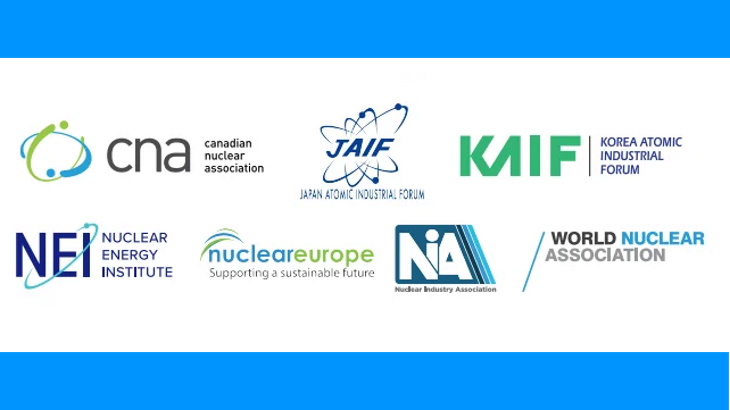Industry ready to help deliver governmental nuclear ambitions
21 March 2024
Alongside the declaration adopted by governments at the inaugural Nuclear Energy Summit, held in Brussels on 21 March, global nuclear industry associations have set out the industry's commitment to supporting government objectives to expand nuclear energy capacity worldwide to achieve climate and energy security goals.

The Nuclear Energy Summit - hosted by the International Atomic Energy Agency (IAEA) and the Belgium government - is the highest-level meeting to date exclusively focused on nuclear energy, bringing together heads of state and ministers from around 30 countries, as well as industry leaders and other stakeholders.
This event builds on the unprecedented support shown for nuclear energy at COP28 in Dubai, where governments and the nuclear industry pledged to triple global nuclear energy capacity by 2050, and nuclear energy was included in the first global stocktake (the process for countries and stakeholders to chart progress towards meeting the goals of the 2015 Paris Agreement).
The full text of the industry statement - jointly issued by the Canadian Nuclear Association, the Japan Atomic Industrial Forum, the Korea Atomic Industrial Forum, the USA's Nuclear Energy Institute, Nucleareurope, the UK's Nuclear Industry Association and World Nuclear Association - is as follows:
"We applaud the convening of the first ever summit of heads of state on nuclear energy by the Prime Minister of Belgium and the Director General of the IAEA, and we welcome the commitment of the national leaders assembled to the development and deployment of nuclear energy to fight climate change, provide energy security, and drive sustainable economic development. We stand ready to work alongside governments to deliver the required nuclear capacity to meet the challenges ahead of us.
Nuclear energy makes a unique and irreplaceable contribution to our global energy needs with:
- Always-on, clean, reliable, and affordable energy for electricity production and to decarbonise hard to abate sectors to achieve the goals of the Paris Agreement.
- Low-carbon electricity with a high energy density on a compact footprint, thereby reducing habitat and biodiversity loss.
- Long asset life to ensure clean energy production for decades to come, thereby reducing utilization of critical minerals.
- High-quality long-term jobs that drive economic growth.
- Energy security against geopolitical, economic, and social challenges.
We note the unprecedented support shown at COP28 for nuclear energy through government and industry declarations to triple nuclear energy worldwide by 2050 and nuclear energy's inclusion in the first global stocktake. This expansion is necessary to achieve climate and energy security goals and will require substantial investments across industry in new projects, new capabilities, and a new skilled workforce.
The global nuclear industry is committed to supporting these objectives through the continued operation of the existing nuclear energy facilities and construction of new facilities, as well as the development of infrastructure and related technologies.
However, for industry to do its part to deliver on these ambitions, governments must:
- Establish the right conditions through consistent and coherent long-term policies that facilitate fleet deployment of nuclear technologies,
- Provide clarity to investors on the funding and investment recovery mechanisms available for nuclear projects,
- Ensure ready access to national and international climate finance mechanisms for nuclear development,
- Ensure that multilateral financial institutions include nuclear energy in their investment portfolios, and
- Clearly and unambiguously label nuclear energy and the associated fuel cycle as a sustainable investment.
- Promote development of the supply chain commensurate with expansion targets and continue investment in nuclear research.
A robust and durable policy framework provides the best possible blueprint for de-risking investments in nuclear energy, reducing costs and accelerating deployment. With this certainty, the nuclear industry can invest in the people, capability and infrastructure needed to execute the ambitious target set out by the governments present today.
The industry stands ready to work in close partnership with governments to unlock the potential of nuclear energy and innovation, while ensuring nuclear safety and security, through commercially driven expansion, and realise the full potential of nuclear technology for our economies, our societies, and our planet.
This is the time to turn plans into action and seize the historic opportunity before us."
Speaking from the event, World Nuclear Association Director General Sama Bilbao y León, said: "This meeting builds upon the good work at COP28, where we saw 25 governments come together and pledge a tripling of global nuclear capacity.
"Today, we welcome the commitment of the national leaders here in Brussels and from around the world, that are shaping energy and industrial policies to accelerate the development and deployment of nuclear energy – as a vital tool for decarbonisation and energy security, but also as a driver for human progress and sustainable economic development. As an industry we are here ready to meet the challenge and turn policies into projects to deliver the necessary nuclear energy expansion."
Researched and written by World Nuclear News